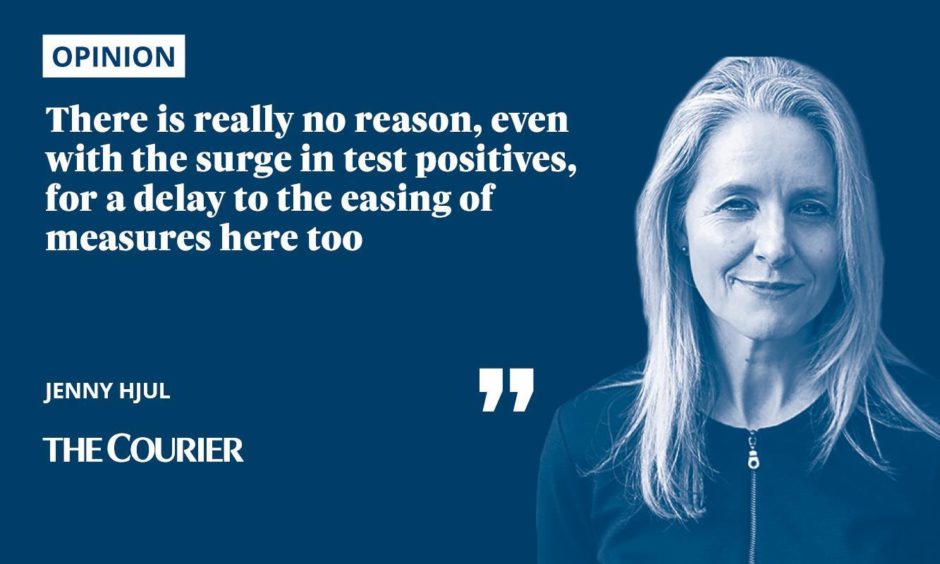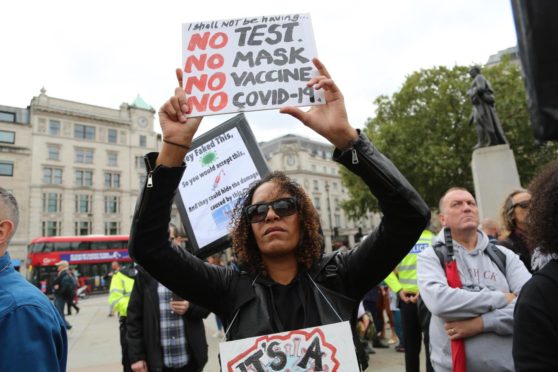As Boris Johnson announced the lifting of most Covid rules, the prospect of freedom became real for the first time in 16 months.
Although there have been gaps between lockdowns and many of the more draconian curbs have already been removed, there remain aspects of our old lives that had all but been forgotten.
But from July 19, in England at least, many of the pettier rules, such as enforced table service in pubs, will end and people will be able to go to the bar and order a drink.
Spontaneity, one of the first casualties of the coronavirus, will return and socialising, whether in or out of work, will be restored.
Hymn singing will be allowed in churches and dancing at weddings, ending two of the dafter diktats of Covid overreach.

At present, this momentous announcement, made on Monday evening, only affects England.
Scotland, where cases of Covid are currently the highest in Europe, has to wait longer for the all clear.
But there is really no reason, even with the surge in test positives, for a delay to the easing of measures here too.
Covid rules gave vaccines time to work
Johnson cautioned that the relaxing of Covid rules will probably lead to an increase in cases but hospitalisations and deaths will be greatly limited by the vaccination programme.
One of the leading scientists behind that triumph, Professor Andrew Pollard, director of the Oxford Vaccine Group, put the pandemic’s trajectory in perspective ahead of Johnson’s briefing on Monday.
“We will be living with this virus for the rest of our lives,” Pollard wrote in a newspaper column.
“Mild cases in the community are OK as long as they stay there. The job of the vaccines is to keep people out of hospital, and the link between infection and hospitalisation is now very weak.”
We are all in this together. https://t.co/m459K3DpAv
— Andrew Pollard (@ajpollard1) July 5, 2021
Nicola Sturgeon seemed finally to have grasped that truth when last week she resisted pressure to delay Scotland’s freedom day, due on August 9.
She must not now be spooked by the hysterics on the opposition benches and, most stridently, from her own side.
How unhinged did the SNP’s health spokesman, Philippa Whitford, sound when she accused the new Health Secretary, Sajid Javid, of letting Covid rip and treating unvaccinated children as ‘collateral damage’?
Wasn’t at all calm – had to go and walk it off later! Have already been in touch with Neale to thank him @JNHanvey
After 17/12 of Hancock being so rude, patronising & dismissive I mistakenly expected at least a modicum of civility from Javid – guess Hancock left him a note! https://t.co/BbqLoqXKuf— Dr Philippa Whitford (@Dr_PhilippaW) July 5, 2021
As a doctor herself she should be more up to speed, both on the difference vaccines have made to community transmission, and to the low impact of the disease on the young.
Fortunately, Javid has a better handle on collateral damage than his predecessor, Matt Hancock.
He said he was ‘shocked’ when he arrived in his new role to discover NHS waiting lists of seven million people who had not sought treatment in the past year.
Scotland must keep pace with change
As England is told it is time to live with Covid, that mask wearing will become voluntary and the rule scrapped, Scotland must not lag behind.
In under a fortnight, controls on capacity at theatres and in sports venues will be swept away, and the “rule of six” abandoned, in England.
In some arenas, much of the paraphernalia of the pandemic is already history. From yesterday, the show courts at Wimbledon were opened to full crowds, and the scenes looked no different from those in 2019, before Covid – and Covid rules – struck.
In fact, anyone who has been in London recently will have had a foretaste of normality, as the streets and transport networks have filled up once more in a happy mass of absent-minded mingling.
There are still those who cling to Covid, who insist they will wear their masks like martyrdom, and who perpetuate the pandemic’s perils.
Some are perhaps genuinely wobbly after nearly a year and a half of government scare mongering, both sides of the border.
Ask why critics want to keep controls
But some have a vested interest in prolonging the agonies of coronavirus even after the threat, for the vast majority, has passed.
Among them are the public health “experts” who have spent the past year and a bit shouting down dissenting voices, even if of superior academic calibre, to safeguard their temporary (let’s pray) pandemic pulpits.
Also, the union bosses seem to be looking for excuses to keep their members off work, particularly if they are teachers who are at almost zero risk of getting ill by going to school.
And there are those politicians, on the right and left, who deployed panic to destabilise the government and who now find themselves on the wrong side of the debate as we emerge from the pandemic.
Some, like Whitford, are still at it but there is little mileage left for the doom merchants, with high profile “doves” in the medical establishment, Professors Chris Witty and Neil Ferguson included, agreeing the Prime Minister’s move is justified.
Sturgeon should take note. The public appetite for pandemic point scoring has diminished along with the dangers of the disease and we all now need to move on.
